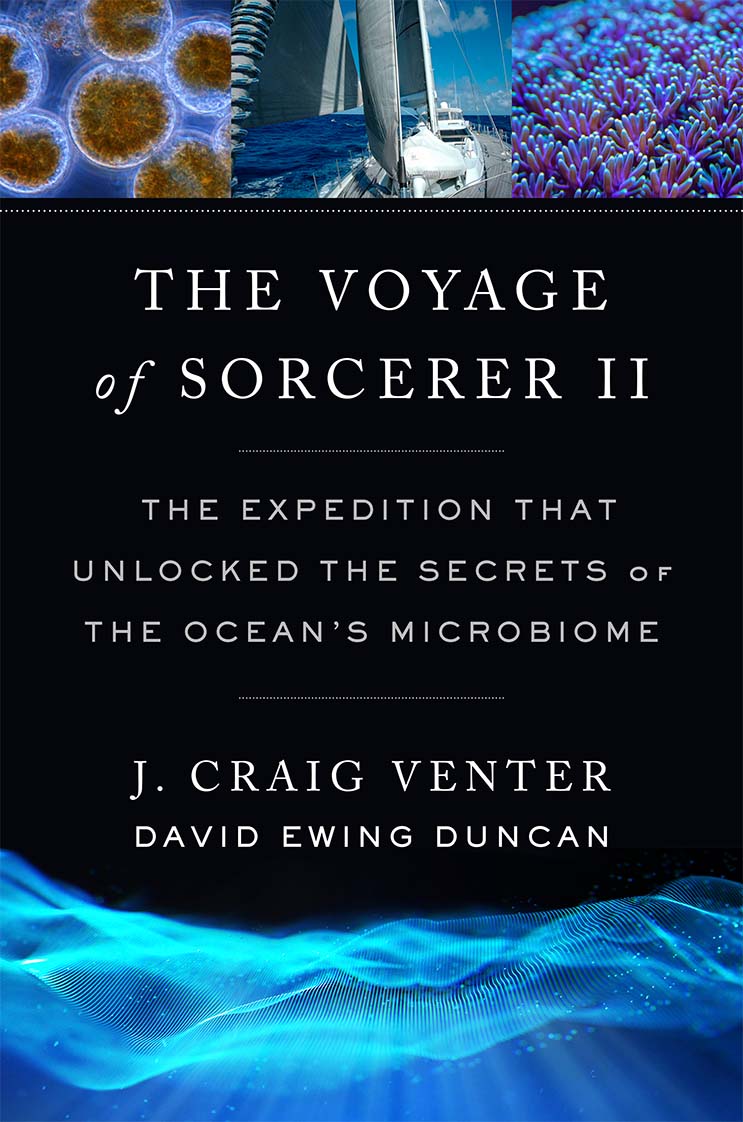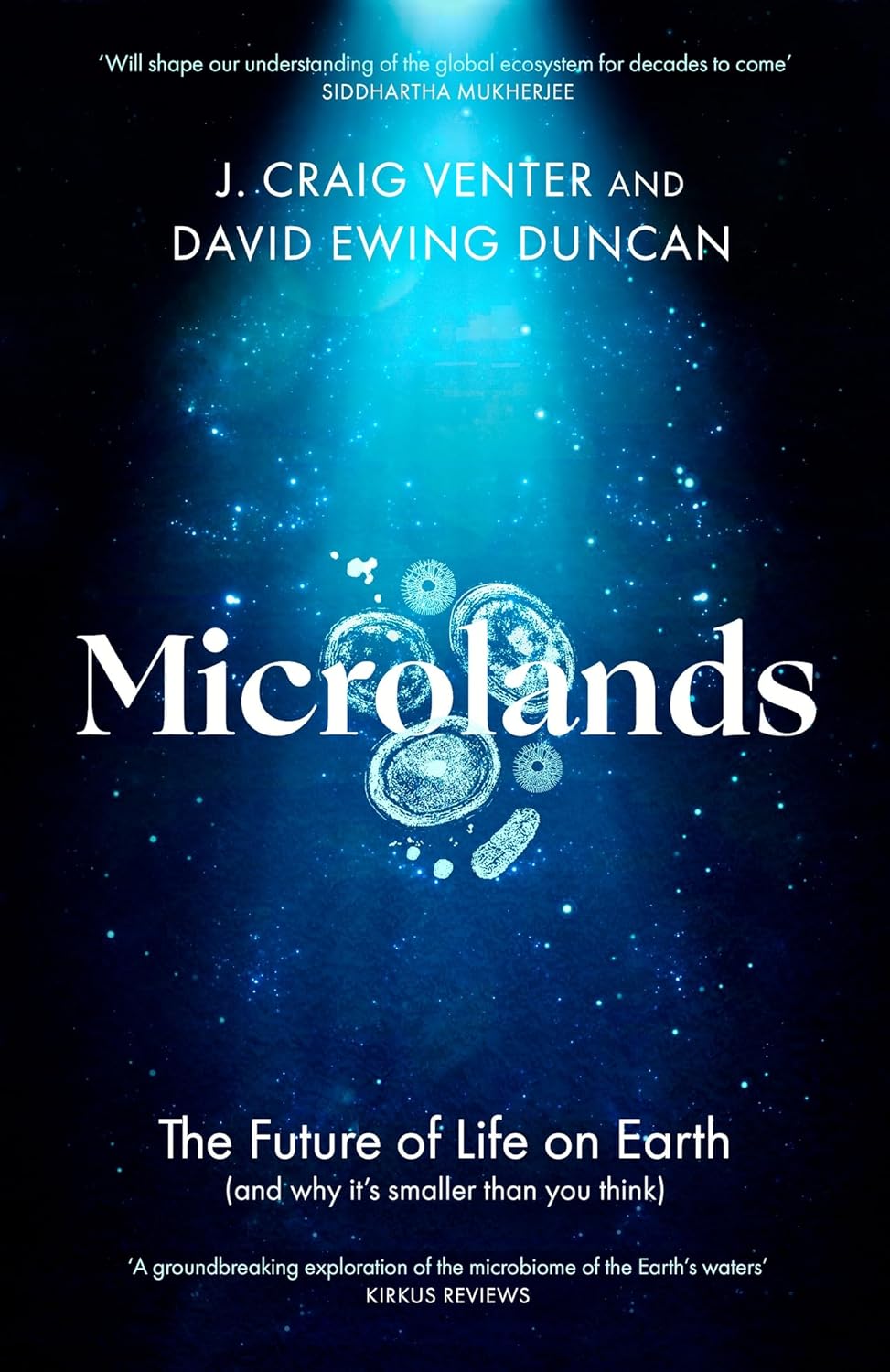THE SECRETS of THE OCEAN’S MICROBIOME


An epic travelogue, brimming with the excitement of discovery. With characteristic panache, Venter unveils the teeming array of bacteria, viruses, and eukaryotes that crowd our planet’s oceans. His research will undoubtedly shape our understanding of the global ecosystem for decades to come.
An exhilarating account of how creative science is accomplished. Few would guess just how many microbes live with us and how much they contribute to human health, both directly in our bodies and by making sure the air we breathe supports life. I have always loved bacteria, but after reading this I have an enhanced appreciation of their value to life on this planet. I highly recommend it.
The Voyage of Sorcerer II combines panoramic linguistic imagery with trenchant scientific insights to provide the reader a virtual seat aboard the most important ship of discovery since Darwin’s Beagle. Venter reveals to us why Earth should be called ‘Water’ and why the ocean’s microscopic life is our deepest and most magical reservoir of genetic diversity. This page-turner gives each of us the thrill of seeing our planet’s largest universe through the brilliant, intrepid eyes of the scientist who has done more than anyone to unlock the secrets of life.
A tour de force. Following in the paths of the Beagle and the Challenger, Venter has expanded biology’s horizons. This book explores microbial life on a global scale, providing cutting-edge solutions to problems of environmental change.
A fascinating inside look at Venter’s historic expeditions that makes the experiences, the analysis, and the transformative discoveries come alive.
We humans may think we are the most important species on Earth, but we’re actually just bit players in a far broader and more complex microbial world. In this exciting journey into that deeper world, Venter and Duncan expand our scope of what it means to be alive.
A ripping tale of how a sailing adventure and science can be combined to revolutionize our understanding of our bodies, the oceans, and the planet.
An epic travelogue, brimming with the excitement of discovery. With characteristic panache, Venter unveils the teeming array of bacteria, viruses, and eukaryotes that crowd our planet’s oceans. His research will undoubtedly shape our understanding of the global ecosystem for decades to come.
An exhilarating account of how creative science is accomplished. Few would guess just how many microbes live with us and how much they contribute to human health, both directly in our bodies and by making sure the air we breathe supports life. I have always loved bacteria, but after reading this I have an enhanced appreciation of their value to life on this planet. I highly recommend it.
Microlands combines panoramic linguistic imagery with trenchant scientific insights to provide the reader a virtual seat aboard the most important ship of discovery since Darwin’s Beagle. Venter reveals to us why Earth should be called ‘Water’ and why the ocean’s microscopic life is our deepest and most magical reservoir of genetic diversity. This page-turner gives each of us the thrill of seeing our planet’s largest universe through the brilliant, intrepid eyes of the scientist who has done more than anyone to unlock the secrets of life.
A tour de force. Following in the paths of the Beagle and the Challenger, Venter has expanded biology’s horizons. This book explores microbial life on a global scale, providing cutting-edge solutions to problems of environmental change.
A fascinating inside look at Venter’s historic expeditions that makes the experiences, the analysis, and the transformative discoveries come alive.
We humans may think we are the most important species on Earth, but we’re actually just bit players in a far broader and more complex microbial world. In this exciting journey into that deeper world, Venter and Duncan expand our scope of what it means to be alive.
A ripping tale of how a sailing adventure and science can be combined to revolutionize our understanding of our bodies, the oceans, and the planet.
After sequencing the human genome and embarking on a reimagining of his Institute and future research, J. Craig Venter, Ph.D. set upon a project combining his two loves: sailing and science. In 2004, after a successful pilot project where the DNA was collected and sequenced at the Bermuda Atlantic Time Series site, Dr. Venter and a team from his Institute launched the Sorcerer II Global Ocean Sampling (GOS) Expedition.
Inspired by 19th century sea voyages like Charles Darwin’s on the H.M.S. Beagle and Captain George Nares on the H.M.S. Challenger, the Sorcerer II circumnavigated the globe for more than two years, covering a staggering 32,000 nautical miles, visiting 23 different countries and island groups on four continents. The expedition continued for fifteen years, collecting tens of millions of marine microbes found in the global oceans and in the process has changed our understanding of this critical resource that sustains us.
In “The Voyage of Sorcerer II,” Dr. Venter and science writer David Ewing Duncan tell the remarkable story of these expeditions and of the momentous discoveries that ensued: of plant-like bacteria that get their energy from the sun, proteins that metabolize vast amounts of hydrogen, and microbes whose genes shield them from ultraviolet light. The result was a massive library of millions of unknown genes, thousands of unseen protein families, and new lineages of bacteria that revealed the unimaginable complexity of life on earth. Yet despite this exquisite diversity, Venter encountered sobering reminders of how human activity is disturbing the delicate microbial ecosystem that nurtures life on earth. In the face of unprecedented climate change, Venter and Duncan show how we can harness microbial genomes to develop alternative sources of energy, food, and medicine that might ultimately avert our destruction.
A captivating story of exploration and discovery, “The Voyage of Sorcerer II” restores microbes to their rightful place as crucial partners in our evolutionary past and guides to our future.
After sequencing the human genome and embarking on a reimagining of his Institute and future research, J. Craig Venter, Ph.D. set upon a project combining his two loves: sailing and science. In 2004, after a successful pilot project where the DNA was collected and sequenced at the Bermuda Atlantic Time Series site, Dr. Venter and a team from his Institute launched the Sorcerer II Global Ocean Sampling (GOS) Expedition.
Inspired by 19th century sea voyages like Charles Darwin’s on the H.M.S. Beagle and Captain George Nares on the H.M.S. Challenger, the Sorcerer II circumnavigated the globe for more than two years, covering a staggering 32,000 nautical miles, visiting 23 different countries and island groups on four continents. The expedition continued for fifteen years, collecting tens of millions of marine microbes found in the global oceans and in the process has changed our understanding of this critical resource that sustains us.
In “The Voyage of Sorcerer II,” Dr. Venter and science writer David Ewing Duncan tell the remarkable story of these expeditions and of the momentous discoveries that ensued: of plant-like bacteria that get their energy from the sun, proteins that metabolize vast amounts of hydrogen, and microbes whose genes shield them from ultraviolet light. The result was a massive library of millions of unknown genes, thousands of unseen protein families, and new lineages of bacteria that revealed the unimaginable complexity of life on earth. Yet despite this exquisite diversity, Venter encountered sobering reminders of how human activity is disturbing the delicate microbial ecosystem that nurtures life on earth. In the face of unprecedented climate change, Venter and Duncan show how we can harness microbial genomes to develop alternative sources of energy, food, and medicine that might ultimately avert our destruction.
A captivating story of exploration and discovery, “The Voyage of Sorcerer II” restores microbes to their rightful place as crucial partners in our evolutionary past and guides to our future.
After sequencing the human genome and embarking on a reimagining of his Institute and future research, J. Craig Venter, Ph.D. set upon a project combining his two loves: sailing and science. In 2004, after a successful pilot project where the DNA was collected and sequenced at the Bermuda Atlantic Time Series site, Dr. Venter and a team from his Institute launched the Sorcerer II Global Ocean Sampling (GOS) Expedition.
Inspired by 19th century sea voyages like Charles Darwin’s on the H.M.S. Beagle and Captain George Nares on the H.M.S. Challenger, the Sorcerer II circumnavigated the globe for more than two years, covering a staggering 32,000 nautical miles, visiting 23 different countries and island groups on four continents. The expedition continued for fifteen years, collecting tens of millions of marine microbes found in the global oceans and in the process has changed our understanding of this critical resource that sustains us.
In “Microlands,” Dr. Venter and science writer David Ewing Duncan tell the remarkable story of these expeditions and of the momentous discoveries that ensued: of plant-like bacteria that get their energy from the sun, proteins that metabolize vast amounts of hydrogen, and microbes whose genes shield them from ultraviolet light. The result was a massive library of millions of unknown genes, thousands of unseen protein families, and new lineages of bacteria that revealed the unimaginable complexity of life on earth. Yet despite this exquisite diversity, Venter encountered sobering reminders of how human activity is disturbing the delicate microbial ecosystem that nurtures life on earth. In the face of unprecedented climate change, Venter and Duncan show how we can harness microbial genomes to develop alternative sources of energy, food, and medicine that might ultimately avert our destruction.
A captivating story of exploration and discovery, “Microlands” restores microbes to their rightful place as crucial partners in our evolutionary past and guides to our future.
After sequencing the human genome and embarking on a reimagining of his Institute and future research, J. Craig Venter, Ph.D. set upon a project combining his two loves: sailing and science. In 2004, after a successful pilot project where the DNA was collected and sequenced at the Bermuda Atlantic Time Series site, Dr. Venter and a team from his Institute launched the Sorcerer II Global Ocean Sampling (GOS) Expedition.
Inspired by 19th century sea voyages like Charles Darwin’s on the H.M.S. Beagle and Captain George Nares on the H.M.S. Challenger, the Sorcerer II circumnavigated the globe for more than two years, covering a staggering 32,000 nautical miles, visiting 23 different countries and island groups on four continents. The expedition continued for fifteen years, collecting tens of millions of marine microbes found in the global oceans and in the process has changed our understanding of this critical resource that sustains us.
In “Microlands,” Dr. Venter and science writer David Ewing Duncan tell the remarkable story of these expeditions and of the momentous discoveries that ensued: of plant-like bacteria that get their energy from the sun, proteins that metabolize vast amounts of hydrogen, and microbes whose genes shield them from ultraviolet light. The result was a massive library of millions of unknown genes, thousands of unseen protein families, and new lineages of bacteria that revealed the unimaginable complexity of life on earth. Yet despite this exquisite diversity, Venter encountered sobering reminders of how human activity is disturbing the delicate microbial ecosystem that nurtures life on earth. In the face of unprecedented climate change, Venter and Duncan show how we can harness microbial genomes to develop alternative sources of energy, food, and medicine that might ultimately avert our destruction.
A captivating story of exploration and discovery, “Microlands” restores microbes to their rightful place as crucial partners in our evolutionary past and guides to our future.